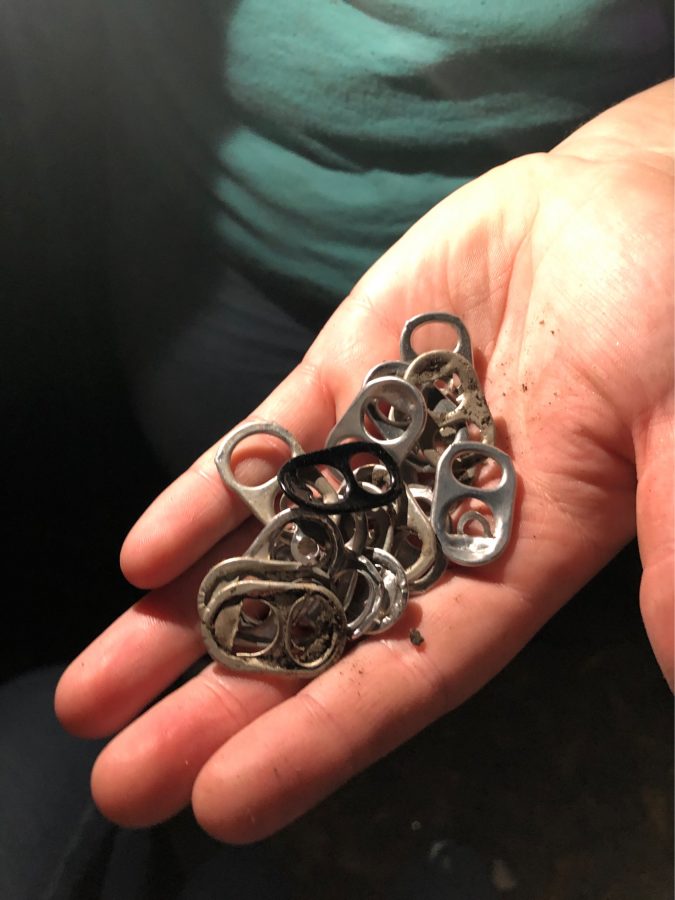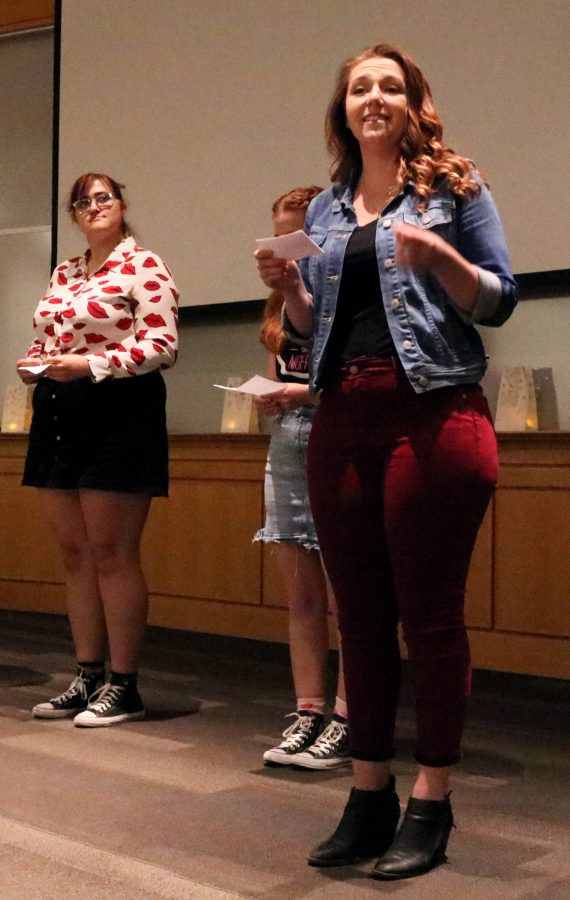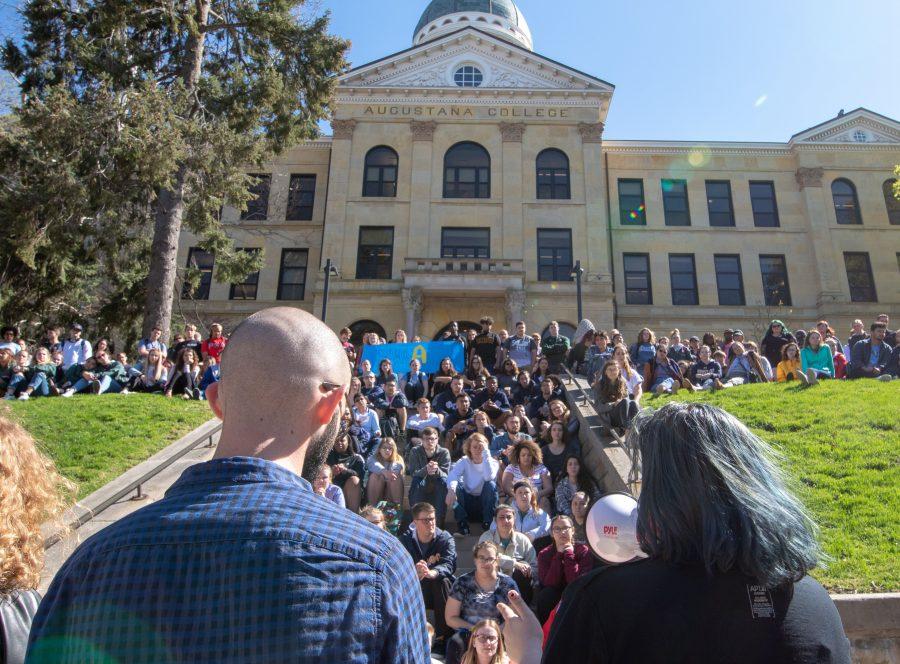I am waist-deep in a recycling bin while my friends are yelling at me to get out, but I heed not their words: this is pop-tabs competition week.
In the bi-annual Greek tradition of a pop-tab collecting contest, groups race to turn in the highest number before the week runs out. At the end of the competition, the gathered tabs are sold to a scrap metal facility to be recycled, and the money is donated to the Ronald McDonald House in Iowa City.
Although the rewards for winning are clearly luxurious and extravagant (donuts at the next chapter meeting ooh), my stake in this game is equal parts infatuation with victory and interest in sustainability. I started scheming as soon as the email came out. I could buy a 30-rack of cheap, bad fraternity-preferred beer and systematically behead them for precious pop-tabs. I could purchase bags from some rando online who had been collecting pop-tabs since 1949 instead of having actual hobbies. Wasn’t that what everyone else was doing?
I wanted to win, but the satisfaction of doing so while having fun gripped me. This is when I started keeping my eyes on the places we try to forget – the shameful, universally human places. On my way to classes, I made it a challenge to see how many cans I could find on the ground while walking through residential neighborhoods and campus paths. After homecoming weekend, I got about 15 cans, and those were just in the easy-to-reach spots on Sunday afternoon.
I was relentless, and I dared my friends to join me on the hunt for pop-tabs. Whether it was professors, local businesses or even alumni, everyone wanted to do their part. Soon, my sorority sisters would text me about pop-tabs they found while on the way home and bring me handfuls of the grime-covered jewels that they’d harvested at parties or bars. Throw in the magic words “charity” and “please” for extra pizzazz, and soon anything good can become a group activity.
The smooth cshh sound of a pop-tab breaking through the metal of a carbonated seal never failed to summon me. I was drawn to places where people invoked the name of consumerism like an ecologically-conscious trash demon. I led with, “Can I have your pop-tab?” before my own name. I would swoop out of the shadows in spray painted basements and come upon unsuspecting Whiteclaw drinkers with my collection jar at the ready.
How long do you really think about keeping a can of soda after you’ve finished its contents? The products we buy are made to be thrown away.
As I hunted on the streets of Rock Island this week, weighted recycling bag announcing my arrival with the clanking of a thousand neglected cans, I mourned for the waste we weren’t collecting: plastic bottles, paper, cardboard, styrofoam, chip bags and so on. We do not confront our trash as often as we make it.
There’s something about trash that we all try to hide from ourselves and from each other. We cover up our discomfort about the weekly pounds of waste we create. We rush to get rid of all evidence that we consumed something in packaging that will far outlive us. Sometimes our desperation to forget leads us to shift responsibility to the ground, in litter that we try to ignore as it stares accusingly when we pass by. In our agreed upon social amnesia, we are complicit in the mass production of trash. Because we erase what it is doing – what we are doing – to our natural systems. By suffocating them with plastic, our silence allows the status quo to continue.
Sure, I was relentless this week. It was an eye-opening, meditative experience about my impact on the world that came from an innocuous and unlikely source: a Greek competition.
But then I thought about how much good we could do regularly – how much more conscious of our carbon footprint we could be – if we did it together and made it fun. How relentless could we all be if we reframed service as an exciting group challenge, rather than something only the bleeding hearts did?
This is our collective problem, and the mountains of garbage seem so daunting when we force ourselves to really look at them for what they are: a consequence of our throwaway lifestyles. But there’s no reason any one person should have to tackle those challenges alone. You can start as a clueless 21 year-old sending emails to bars and end up with an alliance for Daiquiri Factory’s extra pop-tabs. You can start by asking around at parties for pop-tabs and end up rallying your friends around recycling bins. These intersectional environmental issues need group action, and with a little bit of fun and earnestness, we can mobilize strategies to really win.
I realize as I write this that several other groups have already beaten my one week of diligent trash-picking by the first day of the competition. Some groups have amassed hoards of pop-tabs as far as the eye can see, but my triumph is more long-lasting.
This game has become more about the personal success of environmental consciousness to me than about even group pride or the spirit of competition. This week, I remembered what the real battle is, and I’m going to be relentless about that (especially since there’s another pop-tabs competition later this year). I like to think that my ancestors, scrappy and resilient whether in rice fields or thrift stores, would look down at my feet sticking out of the recycling bin and raise a cold one to us.
Featured photo: Sophomore Katie Zenisek holds out a handful of pop-tabs that she scavenged for the competition on Saturday, Oct. 5.
Photo contributed by Brooklynn Schelling












































































































